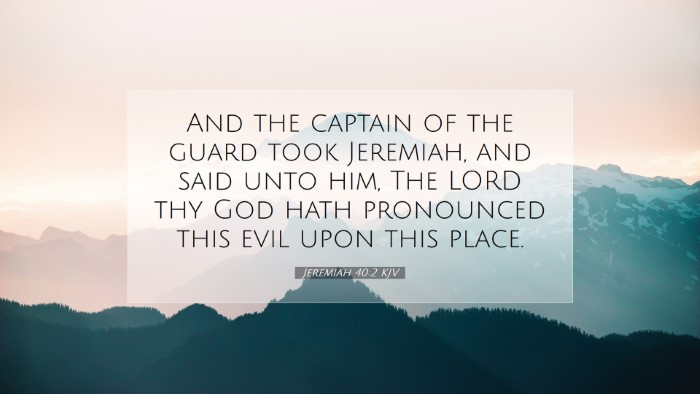Commentary on Jeremiah 40:2
Jeremiah 40:2 (KJV): "And the captain of the guard took Jeremiah, and said unto him, The LORD thy God hath pronounced this evil upon this place."
Contextual Background
The book of Jeremiah, attributed to the prophet Jeremiah, reflects on the tumultuous period leading up to and following the destruction of Jerusalem in 586 B.C. It encompasses messages of judgement, warning, and ultimately the hope of restoration. Jeremiah 40 marks a transitional moment following the Babylonian conquest when a remnant is left in Judea and the prophet is confronted with the reality of captivity and desolation.
Commentary Analysis
The passage centers on the interaction between Jeremiah and Nebuzaradan, the Babylonian captain of the guard. This encounter is significant as it highlights God’s unfailing sovereignty and the unfolding of divine prophecy in the midst of human distress.
Insights from Matthew Henry
Matthew Henry emphasizes the providential design in God's dealing with Jeremiah, illustrating that often, God’s servants encounter trials that simultaneously unveil God's glory and plans. Henry notes that Jeremiah, even in captivity, is afforded a measure of favor and protection, which underscores the idea that God’s presence is not restricted by circumstances.
- Prophetic Assurance: Henry points out that the captain of the guard’s acknowledgment reflects the broader theme of God’s sovereignty over nations and events.
- Jeremiah’s Role: He equates Jeremiah’s situation with that of Joseph in Egypt, suggesting that both are elevated in their moments of tribulation and tasked with a purpose that transcends personal hardship.
Insights from Albert Barnes
Albert Barnes provides a historical lens through which to interpret the passage, stressing the significance of Babylon’s role in the divine judgment against Israel. He comments on the phrase "hath pronounced this evil," indicating that the disastrous conditions in Judah were a direct consequence of the nation's disobedience to God.
- Theological Reflections: Barnes elaborates that the acknowledgment by Nebuzaradan serves to validate Jeremiah as a true prophet, highlighting that even among pagan leaders, there can be recognition of God’s prophetic word.
- Jeremiah’s Commission: Furthermore, he suggests that Jeremiah’s appointment to remain in the land signifies a hope for the restoration and guidance for those who remain after the exile, reinforcing the continued covenantal relationship between God and His people.
Insights from Adam Clarke
Adam Clarke takes a more practical approach in his commentary, providing insight into the emotional and psychological state of Jeremiah during this period. He underscores the profound loneliness and despair that Jeremiah must have felt, yet asserts the hope that comes through trusting in God’s ultimate plan.
- Emotional Resilience: Clarke highlights the nuances of Jeremiah’s character—his resilience amidst sorrow and his duty to lead others spiritually in a time of hopelessness.
- Spiritual Leadership: He suggests that Jeremiah's role was not merely as a prophet but as a spiritual leader who must guide the remnant in understanding the ramifications of their sins and the path to restoration.
Theological Themes
This verse encapsulates several theological themes relevant to modern readers, especially for pastors and theologians aiming to understand prophetic literature in the context of God's justice and mercy.
- Divine Sovereignty: The mention of God's pronouncement of evil signifies His authority in enacting judgment upon nations, reminding believers of God's omnipotence in the unfolding drama of history.
- Hope in Despair: The text serves as a reminder that even when God’s judgment is evident, He provides leaders who will guide His people toward eventual restoration.
- Human Response to Divine Will: Jeremiah’s experience prompts reflection on the nature of obedience and service amidst suffering, posing a challenge for contemporary believers to maintain faithfulness in trials.
Application for Today
For pastors, students, and scholars, this passage invites exploration into how God operates through human history and the call to remain faithful under pressure. Understanding Jeremiah's circumstance can inspire contemporary believers to consider how they can be vessels of hope during times of widespread despair.
- Encouragement for Leaders: Church leaders should reflect on their role as prophetic voices in challenging times, akin to Jeremiah’s, and strive to offer guidance and comfort to those in distress.
- Strengthening Faith: Believers are encouraged to deepen their understanding of God’s sovereignty, learning that His plans often include suffering designed to refine and purify His people.
- Witness in Dark Times: Just as Jeremiah’s fidelity to God's word led to his divine appointment, believers today should remain steadfast, trusting in God's ultimate purposes even when circumstances appear dire.
Conclusion
Jeremiah 40:2 serves as a profound reminder of God's overarching authority and the role of His chosen vessels in conveying His messages. Jeremiah’s response to God’s call, coupled with the acknowledgment of a pagan leader, emphasizes that God’s truth can transcend human understanding and societal structures. The insights gleaned from historical and theological perspectives invite deeper contemplation on the enduring significance of God's word during all epochs of human existence.


